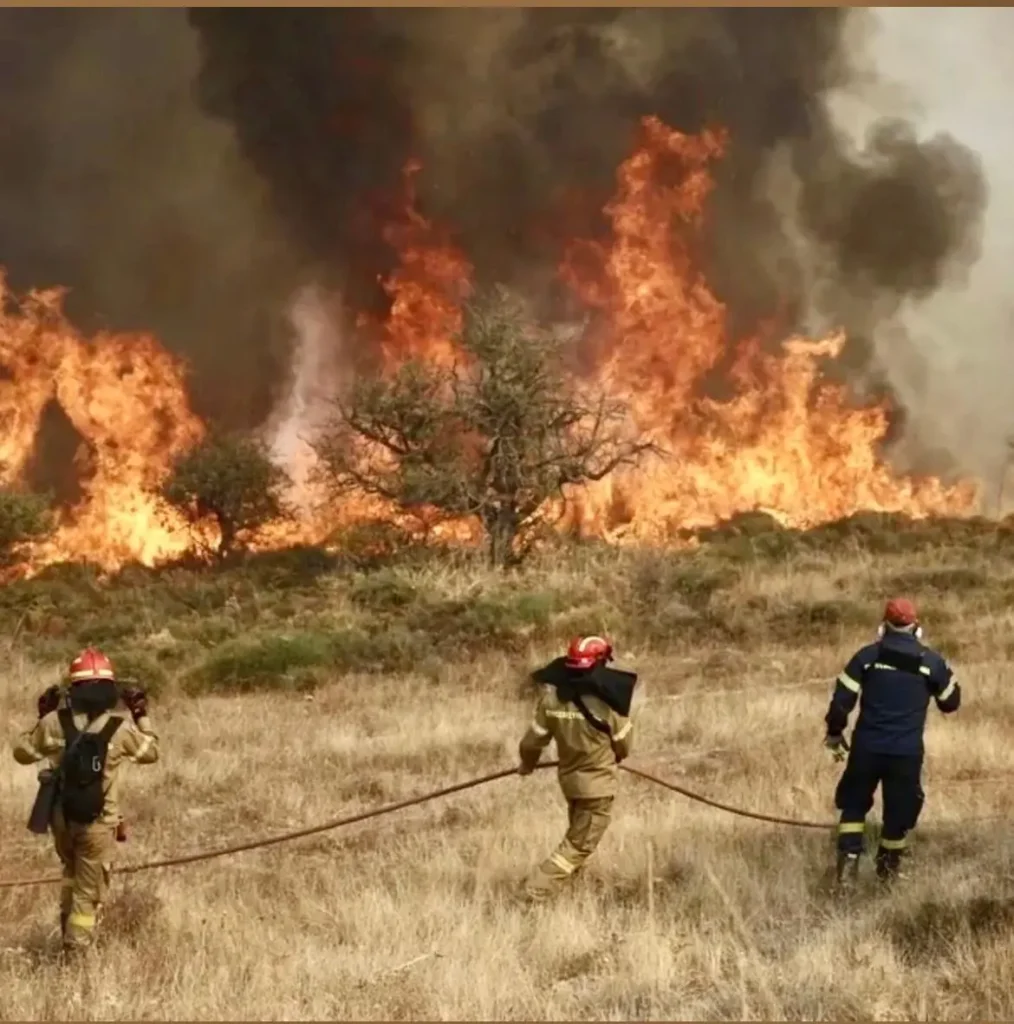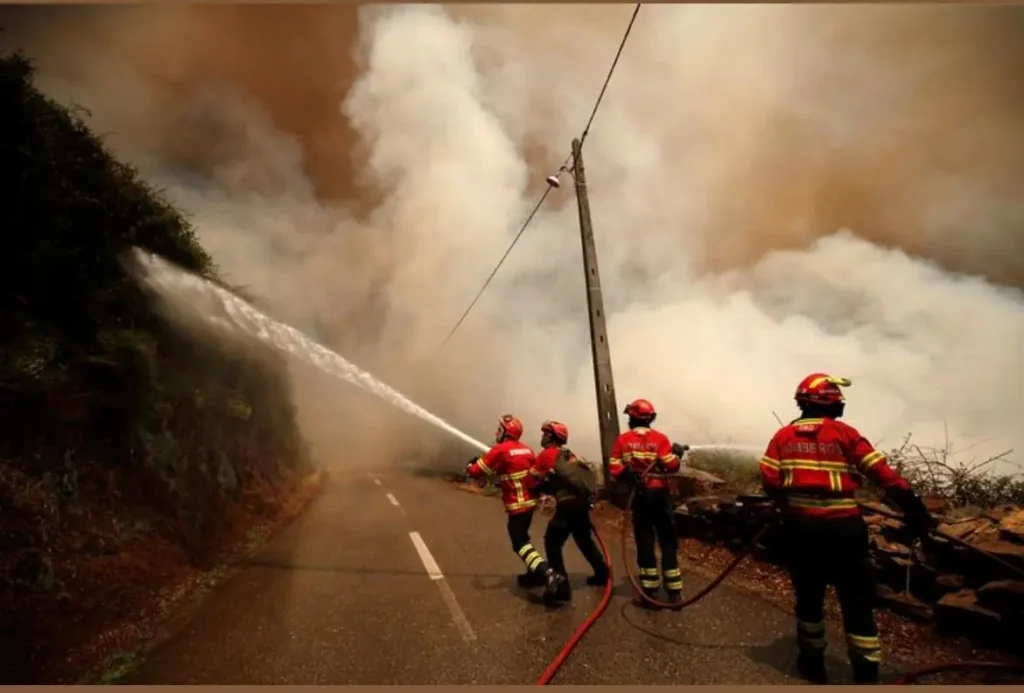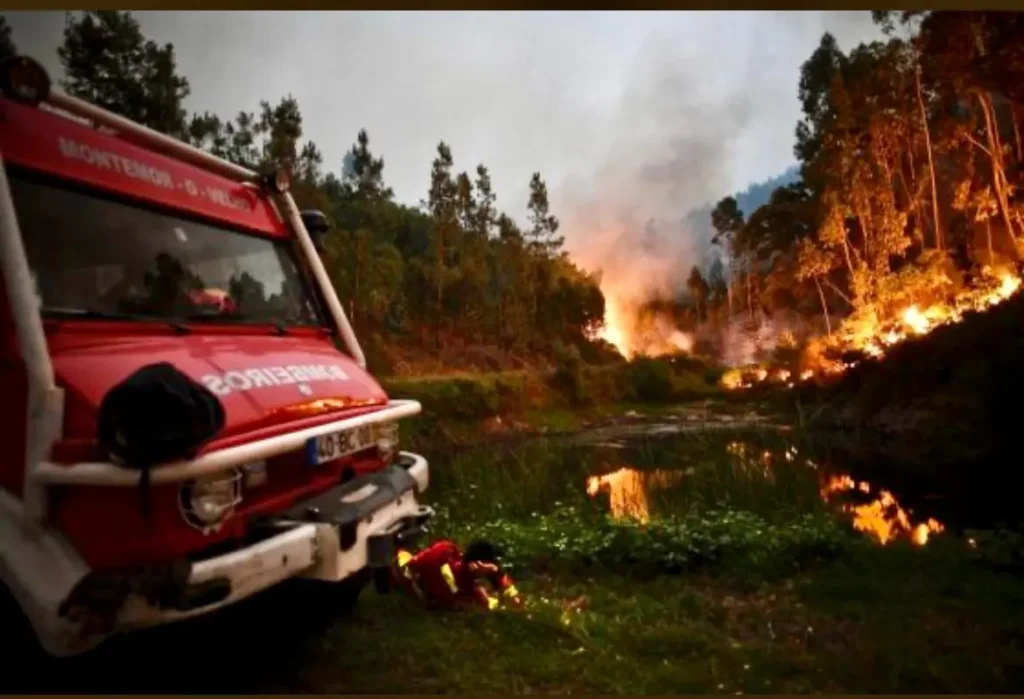Overview of Fires in Portugal
Fires in Portugal cause significant destruction to air quality and increase temperatures. Portugal fought multiple wildfires on Thursday. Firefighters and a special military unit in central Spain spent the night battling fires in the province of Avila, particularly one that was blazing some 60 miles west of Madrid, according to emergency services.

Table of Contents
More than 2,000 firemen were fighting fires in Portugal, especially in the country’s north. With temperatures predicted to soar over the weekend, a large portion of the peninsula is already at high risk of flames. By Sunday, central and southern Spain may see temperatures above 40 degrees Celsius, 104 degrees according to Spain’s meteorological authority. Over most of Portugal, Saturday temperatures are predicted to reach the upper 30s Celsius.
Current Situation of Fires in Portugal
According to the government, there will be a state of alert across mainland Portugal” from Sunday, August 3rd, at midnight until Thursday, August 7th. Future weather predictions indicate a significant increase in the risk of rural fires.” The government explained this warning declaration “comprises a set of exceptional measures” in a statement distributed to newsrooms by the Ministry of Internal Administration following the Minister’s press conference this Saturday.
Thus, within the scope of the declaration of the alert situation, provided for in the Civil Protection Framework Law, the following exceptional measures will be implemented.
Fires in Portugal and Necessary Precautions

The government strictly announced that access, circulation, and permanence are prohibited within forest areas previously designated in Municipal Forest Fire Protection Plans, as well as on forest paths, rural paths, and other roads that cross them.
The extensive burning and burning of cut and piled waste are prohibited, and authorizations are suspended; using any kind of machinery for work in forest areas other than that used to combat rural fires is prohibited.
Always prepare ahead of time to shield yourself from the smoke from wildfires.
To receive real-time air quality forecasts and warnings, download a free app.
Close the windows and doors and switch the air conditioner to recirculate.
Use a powerful air purifier to filter smoke from wildfires.
Participate in the outdoor air quality data collection in your community.
Using bladed brush cutters or metal discs, brush cutters, shredders, and machines with blades or front shovels are prohibited in rural areas.
Major Causes of Portugal Fires
Fires in Portugal are the byproduct of some human negligence and climate change. The work related to animal feeding and watering, phytosanitary or fertilization treatments, watering, pruning, harvesting, and transporting crops, as long as they are necessary and inevitable, and are done in irrigated areas or areas free of forests, woods, or flammable materials, and from which there is no risk of ignition.
Manually extracting cork and extracting honey, as long as they are done without the use of smoking techniques obtained by glowing material or temperature generators. Harvesting crops using machinery, especially harvesters, and performing forestry operations involving cutting, trimming, and transporting, between sunset and 11:00, provided that rural fire risk mitigation measures are implemented and their execution are communicated to the appropriate municipal authority.
Fires in Portugal and Spain

The Portugal and Spain Wildfires are still burning in central and northern Portugal as well as the Castile and Leon region of Spain as of July 30, 2025. Significant fires are raging in Portugal near the Tagus and Douro valleys in Arouca, Penamacor, and Ponte da Barca. The Avila Wildfire in Spain is burning close to Mombeltran, around 100 kilometers west of Madrid. Strong winds and temperatures above 40°C are what ignite the fires. Major Cities Affected by Fires in Portugal and Spain
A very dangerous fire has been reported in the forests of Portugal and Spain, which has been trying to extinguish for several days. The damage caused by these fires is also very severe. This is making the climate even hotter. The month of August is very hot, but due to these fires, the temperature has increased even more.
Major Affected Areas By the Wildfires:
Portugal’s Arouca
Spain’s Avila
Portugal’s Canelas
Mombeltran, Spain
Portugal’s Penamacor
Spain’s Ponte da Barca
Lisbon’s Proença-a-Velha
Portugal Fires and Outcomes
The air quality in these areas has deteriorated due to smoke, and people of Mombeltran have been forced indoors because of the harmful pollutants . Community efforts were launched to save centuries-old olive groves in Proença-a-Velha, Portugal, after they were threatened.
Most of the wildfires are still uncontrolled. Spain is giving aerial help as more than 1,300 firemen and 12 water bombing planes fight fires in Arouca, Penamacor, and Ponte da Barca, Portugal.
With winds and rough terrain impeding efforts, the Avila Wildfire in Spain has burned more than 500 hectares and is still going strong. The intense heat is causing containment to go slowly.
FAQS
What is the current situation of Portugal fires?
Around 39 wildfires are raging in Portugal right now, with nine large fires centered in places like Arouca, Penamacor, Santarem, and Ponte da Barca. More than 2,700 emergency personnel and 881 vehicles are being sent out to combat these fires nationwide.
What are the main causes of Portugal fires?
Most fires are caused by human carelessness and major fires are caused due to the climate change.
When does Portugal’s fire season begin?
The peak fire season starts from June and ends in August or September.
Which areas of Portugal see the highest fire rates?
Fires are most common in central and northern inland regions, especially in forested and rural areas.
Does Portugal experience fires frequently each year?
Yes, Portugal faces fires every year.